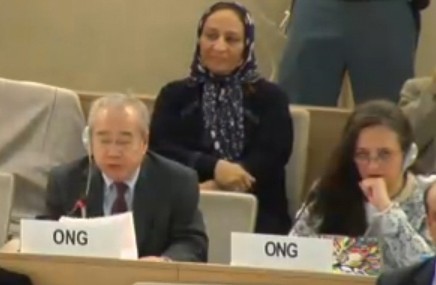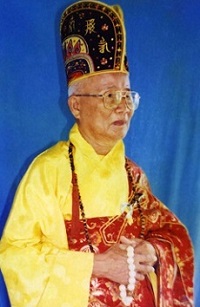GENEVA, 15 March 2017 (VCHR) – Speaking on behalf of Agir Ensemble pour les Droits de l’Homme at the UN Human Rights Council in Geneva today, Mr. Võ Văn Ái, President of the Paris-based Vietnam Committee on Human Rights (VCHR) denounced grave and consistent violations of the right to freedom of religion or belief in Vietnam, in particular the adoption of a new restrictive law on religion and the harsh treatment of religious prisoners.
In his statement to the 34th session of the UN Human Rights Council which is meeting in Geneva from 27 February – 24 March, Mr. Ái told the UN body that Vietnam’s new Law on Belief and Religion, adopted in November 2016 and coming into force in January 2018, is inconsistent with Article 18 of the UN International Covenant on Civil and Political rights to which Vietnam is a state party because it forces religions to make an impossible choice; “either they accept to register and submit to the control of the one-Party state, or they refuse to register, and suffer brutal repression”. The new law imposes a strict process of registration and mandatory authorization for almost all religious activities. This is a violation of the international human rights law which recognizes freedom of religion or belief as an absolute right that cannot be limited by any administrative requirements, he told the Council.
“Vietnam tells the international community that this law is a step forward towards the respect of the rule of law and religious freedom, but in reality it is just one more brick in the wall of restrictive legislation built by the Vietnamese authorities to mask their ongoing abuses of freedom of religion or belief”, said Võ Văn Ái. “Although the law has not yet come into force, since its adoption we have observed an escalation of religious persecution of alarming proportions”, he said.
Mr. Võ Văn Ái gave three examples of long-term religious prisoners whose health is seriously deteriorating due to harsh conditions under arbitrary detention. They are:
– Buddhist monk Thích Quảng Độ, 89, Patriarch of the non-recognized Unified Buddhist Church of Vietnam (UBCV), who has been detained under different forms (prison, internal exile and house arrest) almost without interruption since 1982. He is currently under house arrest without justification or charge at the Thanh Minh Zen Monastery in Ho Chi Minh City under permanent Police surveillance. Whereas foreign diplomats are often allowed to visit him, Vietnamese Buddhists who try to meet him are often intimidated and harassed. In recent months, Thích Quảng Độ has been subjected to strong pressure from the authorities, sometimes through the intermediary of relatives, to move away from Saigon to live in a remote temple in northern Vietnam, or to live in a Pagoda belonging to the State-sponsored Vietnam Buddhist Sangha (VBS), where he would be totally isolated from his disciples and UBCV members. Mr. Võ Văn Ái called on the UN Human Rights Council to press for Thích Quảng Độ’s immediate and unconditional release;
– Hoa Hao Buddhist and land rights’ activist Ms Trần Thị Thúy, 45, who is in extremely poor health in An Phước Prison Camp in Bình Dương province. In 2011 she was sentenced to 8 years in prison for “activities aimed at overthrowing the people’s administration” (Article 79 of the Vietnamese Criminal Code) at an unfair trial because of her protests against State confiscation of land. In prison, the authorities gave her medication that seriously affected her mental health. She now suffers from a tumour on her uterus and painful boils all over her body, and is unable to walk without assistance. Despite her serious condition, the prison authorities deny her all access to medical care, and even refuse to give her medicines brought by her family;
– Lutheran Pastor Nguyễn Công Chính, who is serving an 11-year sentence in Xuân Lộc Prison Camp in Đồng Nai province. Convicted of “undermining national solidarity” (Article 87 of the Criminal Code) simply for his legitimate religious activities and beliefs, Pastor Chính suffers from high blood pressure, sinusitis and painful arthritis, yet is denied all medical care. His wife, who is only allowed to visit him every two months, says his health has deteriorated significantly since her last visit, and hands and legs are badly swollen.
Mr. Võ Văn Ái declared that all three are not only victims of arbitrary detention, but their inhuman detention conditions and lack of access to adequate medical care violate the provisions of the UN Convention against Torture and other cruel, inhuman or degrading treatment or punishment that Vietnam ratified in 2015.
He also denounced a recent wave of physical assaults and harassments of human rights defenders and religious followers, and raised the case of Protestant Pastor Nguyễn Trung Tôn, a former political prisoner. On 27 February 20117, when he travelled to Quảng Bình province to meet other victims of police violence, Pastor Tôn was kidnapped by individuals whom he recognized as plain clothes security police. They took him to a remote forest area and beat him brutally, before stealing his clothes and possessions and leaving him naked and bound with no means of transport. In 2011, Pastor Tôn was sentenced to two years in prison for “circulating propaganda against the Socialist Republic of Vietnam” (Article 88 of the Criminal Code), and recently complained that he had been repeatedly intimidated and harassed by Police in recent weeks.






0 Comments
You can be the first one to leave a comment.